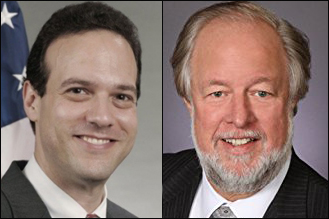
With another shutdown deadline on horizon, senators seek budget process reform
With the prospect of yet another government shutdown deadline in less than a month, two members of the Senate Budget Committee agree that the current process of...
With the prospect of yet another government shutdown deadline in less than a month, two members of the Senate Budget Committee — one Democrat, one Republican — agree that the current process of funding the federal government needs a serious overhaul.
Earlier this month, Congress ended an hours-long shutdown by passing the Bipartisan Budget Act of 2018, which raises spending caps $300 billion higher than current levels for the next two years. However, lawmakers still must pass an appropriations measure before midnight on March 23.
Lawmakers have yet to pass a comprehensive budget for fiscal 2018, even though the fiscal year is nearly halfway over. And yet, Sen. David Perdue (R-Ga.) said he’s not surprised, because Congress has almost never passed an on-time budget in recent memory.
In the past 44 years, Congress has only approved an on-schedule federal budget four times. In the same timeframe, the federal government has shut down 20 times.
“This is a system that does not allow for active debate. I fought hard to get on the Budget Committee, coming from the business world, thinking this is where the action is. Well, it’s a joke. I would blow the Budget Committee up unless we change some of these rules. Seriously, it does nothing,” Perdue said.
The Bipartisan Budget Act of 2018 also established a Joint Select Committee on Budget and Appropriations Process Reform, which Perdue said is a step in the right direction.
However, Frances Lee, a University of Maryland government and politics professor, told a panel Monday she’s “pretty skeptical” about any progress from the new joint committee.
“Our political environment has encouraged a lot of short-term thinking on the part of members of Congress, because every election has held out the possibility of a change of party control of one institution or another. So that makes it hard to agree to any kind of long-term fiscal arrangements when you expect a major change in political power could potentially be right around the corner,” Lee said. “Why cut a deal now if you’d be in better circumstances in a short timeframe?”
While the budget committees don’t hold much leverage amid the constant threat of government shutdowns, Sen. Sheldon Whitehouse (D-R.I.) said this ongoing state of budget brinksmanship hands lots of power to congressional appropriators and leadership.
Whitehouse said that dynamic has been apparent in the last few shutdown deadlines, where back-room budget deals have emerged at the last minute and rushed through the House and Senate.
“Nobody’s seen it, it’s never been voted on the floor. It just gets jetted straight in. And then six people from leadership and the appropriations chairs go in, and they hash out the deal amongst themselves, and everybody else in the Senate is left being a supplicant, begging and pleading that the thing they want gets in there, with no chance to have a vote on it, no chance to have a debate on it, and that’s not democracy, frankly. It’s a mess. But it does confer a very great amount of power — basically how we spend all of our money gets decided by two handfuls of people in a totally non-transparent environment,” Whitehouse said.
No matter what recommendations the new joint committee hands down, Perdue said the budget needs to be completed by an early point in the fiscal year, and then go through the appropriation process to give agencies time to start implementing before the end of the fiscal year.
“There are many people, particularly in the military, who are buying these billions of dollars of capital goods every year, [and] they can’t tell people until of the first day of the new year — even if you get it done on time — what the plan is. And now, we’re five months into the new year, and we still haven’t told these guys what the plan is for this fiscal year,” Perdue said.
Maya MacGuineas, the president of the Committee for a Responsible Federal Budget, said running the federal government without a budget has been the new normal for too long.
“All you have to think about is the fact that some of the more common words in the budget process these days are ‘government shutdown’ and ‘default.’ That is not how a great nation or a great economy runs itself,” MacGuineas said.
Once Congress breaks out of the continuing resolution-and-shutdown cycle, Perdue said he’d like to see more of a long-term spending plan for the future.
“We don’t have a capital budget in this government. We’re buying billions and billions and billions of dollars of long-term capital goods — it takes decades for some of this stuff to actually get built — and yet we don’t have a capital budget plan, so there’s no long-term plan about how to allocate that,” he said.
Copyright © 2024 Federal News Network. All rights reserved. This website is not intended for users located within the European Economic Area.
Jory Heckman is a reporter at Federal News Network covering U.S. Postal Service, IRS, big data and technology issues.
Follow @jheckmanWFED
Related Stories





